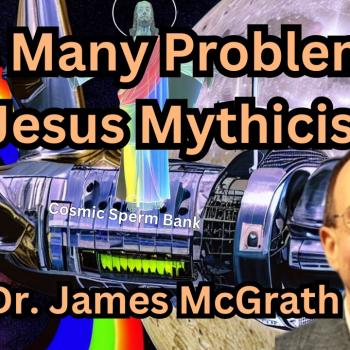Neil Godfrey has a post which claims that I’m unconcerned with facts and details. And unsurprisingly, his post has little interest in facts and details. It repeats Richard Carrier’s claim that mythicism is embraced by individuals like Thomas Thompson (who has distanced himself from mythicism) and Kurt Noll (whose contribution to Is This Not the Carpenter?
is rather wonderful and does much to undermine mythicism).
He also claims that I am somehow ignoring the plain words of what Brodie wrote, even though the list I made of reasons why Brodie had trouble having his claims accepted are precisely what Brodie wrote. The only possible question about that is whether Brodie’s issues with not doing research and writing in an appropriate manner affected his ability to get things published, or only the assessment of his assignments by his professors when he was a student. As Brodie says, and I repeat, it was above all else his attempt to publish the idea that Jesus never existed through a Christian publisher.
If a Christian tried to publish a piece of dubious apologetics with American Atheist Press, and had their manuscript rejected, would anyone consider that evidence of discrimination against Christians in the academy?
Neil Godfrey offers posts of increasing length as though that somehow made up for lack of depth, when what he has to offer is nothing but a silly waste of time. Just read Brodie for yourself and see whether he makes a persuasive case for his views. Don’t let mythicist attempts to spin and dissect a book review distract from the point. It is just like the creationists who keep saying “there’s no evidence for evolution” and work hard to spin the mountains of evidence against their own position and to distract from all the ways that they are wrong by pointing out things that might be wrong in this or that writing reflecting mainstream science. Human beings are imperfect, and even solid scholarly work doesn’t always manage to avoid all errors, from typos to miscalculations. But those minor errors do not change the fact that serious work is being done by these human researchers, and that they consistently reach a particular conclusion. And so even if my book review had in fact been full of errors, it would not make mythicism plausible, any more than when a young-earth creationist finds that this or that book or book review contained an error, it changes the overall state of our scientific knowledge.
I encourage you to read my review, read Brodie’s book if you have access to it, read the posts at Vridar, and let me know whether the latter are anything other than an attempt to distract from the serious shortcomings in Brodie’s work, and its utterly unpersuasive character.













